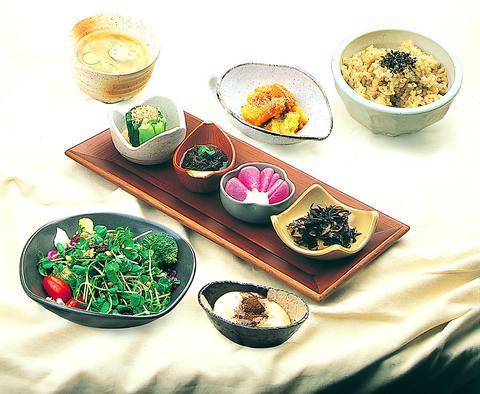Although its roots are in eastern philosophy, macrobiotics is a rarity in Taiwan. Increasingly trendy in the US and Europe, macrobiotics is the practice of balancing each meal with organic foods that are categorized as either Yin (more sweet) or Yang (more salty), similar to the Chinese system of labeling foods as either hot or cold.
The ultra-healthy diet gained popularity when it was exported to the West by Japanese businessman George Ohsawa in the early 1900s.

PHOTO COURTESY OF YOGI HOUSE INTERNATIONALN
A lot of people turn their noses up at macrobiotic meals because they assume the food will have no flavor, said Yogi House owner Tu Shu-feng (涂淑芬).
Tu's is the first purely macrobiotic restaurant to open on the island and although a meal of organic vegetables, beans and whole grains might sound too healthy to be appetizing, the set dinners offer some of the tastiest dishes in the city.
The meal consists mostly of whole grain starches, then vegetables and fruit and only a small meat, seafood or bean portion. A macrobiotic diet is not strictly vegetarian, but meat and dairy are often substituted with a soy-based product.
Main courses at Yogi House consist of a selection of noodle dishes including Japanese soba or sesame noodles, a long list of hot pots such as spicy-sour Thai with soy milk, and a few unique offerings like pumpkin burgers or tropical curry.
Tu recommends the macro classics to anyone wanting to sample a typical macrobiotic meal. Served with four vegetable side dishes, which vary depending on the season, the classic combines both steamed pumpkin and a bowl of long-grain brown rice as its starch base. The vegetable portions are small, but each is served in its own distinctly flavored sauce. On this particular visit, the veggies included marinated shitake mushrooms, stewed carrots and bamboo, seaweed in grape vinegar and sweet potato leaves in a sesame paste.
The second most popular and highly recommended dish is the pumpkin burger, which is actually more like a sandwich made with mashed pumpkin, lettuce, tomato and served on multi-grain bread. It also comes with a side order of pasta that uses a fresh tomato and basil sauce.
A little more than two weeks since its opening, Yogi House might not be the only macrobiotic restaurant for long. Having studied in Japan, Tu is currently offering prospective restaurant owners lessons on how to prepare the meals. Given the growing number of organic groceries and eateries in Taipei city, macrobiotics may well be one fad that lingers on.

That US assistance was a model for Taiwan’s spectacular development success was early recognized by policymakers and analysts. In a report to the US Congress for the fiscal year 1962, former President John F. Kennedy noted Taiwan’s “rapid economic growth,” was “producing a substantial net gain in living.” Kennedy had a stake in Taiwan’s achievements and the US’ official development assistance (ODA) in general: In September 1961, his entreaty to make the 1960s a “decade of development,” and an accompanying proposal for dedicated legislation to this end, had been formalized by congressional passage of the Foreign Assistance Act. Two

Despite the intense sunshine, we were hardly breaking a sweat as we cruised along the flat, dedicated bike lane, well protected from the heat by a canopy of trees. The electric assist on the bikes likely made a difference, too. Far removed from the bustle and noise of the Taichung traffic, we admired the serene rural scenery, making our way over rivers, alongside rice paddies and through pear orchards. Our route for the day covered two bike paths that connect in Fengyuan District (豐原) and are best done together. The Hou-Feng Bike Path (后豐鐵馬道) runs southward from Houli District (后里) while the

March 31 to April 6 On May 13, 1950, National Taiwan University Hospital otolaryngologist Su You-peng (蘇友鵬) was summoned to the director’s office. He thought someone had complained about him practicing the violin at night, but when he entered the room, he knew something was terribly wrong. He saw several burly men who appeared to be government secret agents, and three other resident doctors: internist Hsu Chiang (許強), dermatologist Hu Pao-chen (胡寶珍) and ophthalmologist Hu Hsin-lin (胡鑫麟). They were handcuffed, herded onto two jeeps and taken to the Secrecy Bureau (保密局) for questioning. Su was still in his doctor’s robes at

Mirror mirror on the wall, what’s the fairest Disney live-action remake of them all? Wait, mirror. Hold on a second. Maybe choosing from the likes of Alice in Wonderland (2010), Mulan (2020) and The Lion King (2019) isn’t such a good idea. Mirror, on second thought, what’s on Netflix? Even the most devoted fans would have to acknowledge that these have not been the most illustrious illustrations of Disney magic. At their best (Pete’s Dragon? Cinderella?) they breathe life into old classics that could use a little updating. At their worst, well, blue Will Smith. Given the rapacious rate of remakes in modern